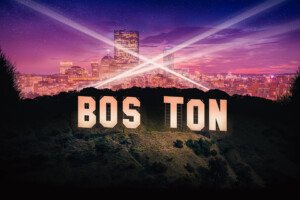The Making of Patriots Day
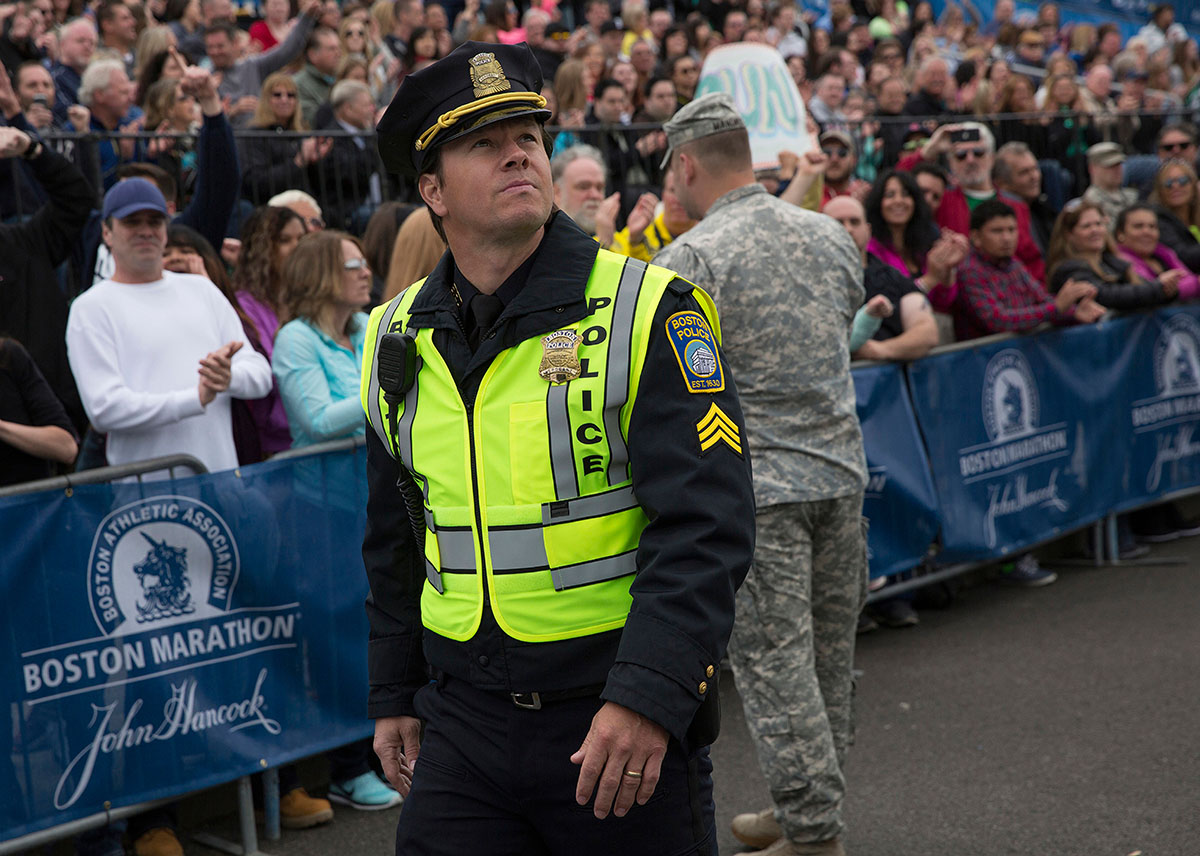
Mark Wahlberg plays a Boston police officer in Patriots Day. / Photograph by Karen Ballard
The Right Direction
Writer and director Peter Berg talks about the challenges he and Mark Wahlberg faced on the road to creating Patriots Day.
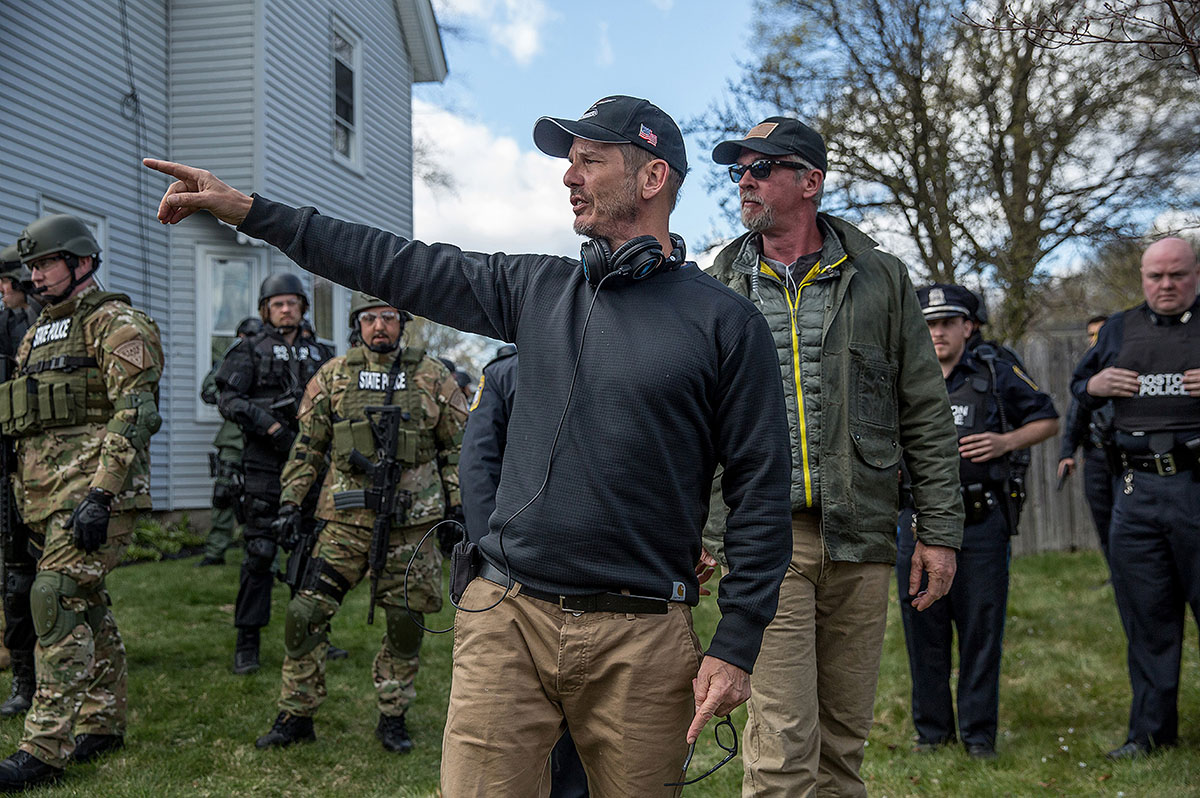
Peter Berg directs a scene depicting the manhunt for Dzhokhar Tsarnaev. / Photograph by Karen Ballard
Leading into this film, you and Mark Wahlberg talked a lot about “getting it right.” What did that mean to you?
I think there were a couple of different areas that I was more concerned about in terms of getting it right. One being just literally the facts: What happened? Who did what, where, and how? What role the different law enforcement agencies had, including the FBI, and the experience of the EMT workers, the firefighters, the hospital workers, some of the victims we worked with in the film. I was interested in trying to explore whether there was any logical explanation for this barbaric behavior. I wanted to do everything I could to make sure that we did the research to really get a clear understanding of what transpired.
Why was it important for you to make sure that actual Bostonians were involved in the movie?
Well, I think that in general many other films have done it, writing in real people. When I did a film about Navy SEALs, I had as many SEALs as I could. Real cops playing cops, real paramedics playing paramedics—that’s just something that I believe in, it’s kind of the style of moviemaking that I like. For Patriots Day, I had the opportunity to get the real men and women working on the SWAT teams, that were driving ambulances to hospitals. It made everybody on my side pay a little more attention and work harder knowing that these guys really went through this.
Did you feel like the production of this film went smoothly?
I would say it went smoothly. The biggest challenge was doing everything I could to make sure that in our effort to get the facts right, we met with as many people who were directly involved in or affected by the bombings as possible. We spent a lot of time sitting down with people—hearing their stories and listening to their concerns and processing those concerns—as I was trying to shape what the movie would be. Balancing the community’s concerns with the narrative of the film, that was challenging, but that kind of challenge is what inspires me. It’s what gets me so excited to make films.
So how do you walk that tightrope?
I think it’s a matter of taste. I think there’s an invisible line, and you know when you cross it in terms of sensationalizing something or overhyping something or being gratuitous. I talked to many of the victims, the people who were there when the bombs went off. We talked about how the movie was going to portray the immediate aftermath of the explosion, since it was obviously a very traumatizing environment. People were concerned and wanted to know how theatrical it was going to be, and my answer was, “We’ll know when we go too far; we’ll make sure we don’t.” One of the reasons to make a movie like Patriots Day is so people never forget exactly how vicious and diabolical that crime was. In order to do that, we can’t shy away completely from the intensity. But we have to be conscious that there is a line. I think that we found the right balance.
What perspective did Wahlberg bring to Patriots Day, and why do you think he felt the need to be a part of it?
With Mark there’s a little added—a lot of added—pressure and responsibility, because he’s so popular in Boston, so well known. I think he really wanted to be a part of this story because of that connection to the city. It’s clear to me that he not only deeply loves Boston, but also carries Boston with him wherever he is. His inner circle, his best friends—the original entourage, the really great guys he’s known since he was six or seven years old growing up in Dorchester—these are the people with him every day. I think that he felt that this story was important to tell and that he felt that he should be a part of it.
I’m not from Boston—I’m a New Yorker—and I was able to spend time with Mark. I would drive into the city and he would show me different streets and different corners. He showed me where he got arrested, and where he kissed his first girl, and where he grew up. It was a great opportunity to see just how connected to the community he is and get a real sense of this actor and how much he’s achieved.
Other than Mark, who do you think had the best Boston accent?
I’m going to go with Boston local John Enos, who plays a Boston cop. His accent was probably the most impeccable.
Why did you choose to include David Ortiz in the film?
Everyone has a personal experience during that period of time. David talked about how the Red Sox went on a road trip right after the bombings, but he was hurt so he stayed in Boston, and when the order to shelter in place was given, he understandably had to shelter in place. He talked about how scared he was and how angry he got. I think that being in Boston throughout that, being locked in his house like everyone else, fueled that fire that came out when he gave that very memorable speech. I think I was in California when I watched him give that speech, and I was getting goose bumps and tears in my eyes. It was undeniably powerful—a very organic moment. We wanted to do some additional work with David around that in the movie. I’m not going to tell you what we did yet. You’ll have to see it.
Setting the Scene
It’s not easy to re-create something as iconic as the Boston Marathon finish line. But production designer Tom Duffield and his team had to do exactly that at a former naval air station in South Weymouth, crafting an 850-foot-long Boylston Street reproduction that replicated the precise bends, slopes, and contours of the thoroughfare. While Duffield has nothing but praise for his production crew, he could have done without one distinctly un-Hollywood hindrance while putting together his marathon model: snow. “That is one brutal place to shoot a movie,” Duffield says. “I told our painters and our construction guys they are the toughest construction crew I have ever been associated with. They’re like Navy SEALs or something.” Below, Duffield breaks down the movie’s most important set piece.
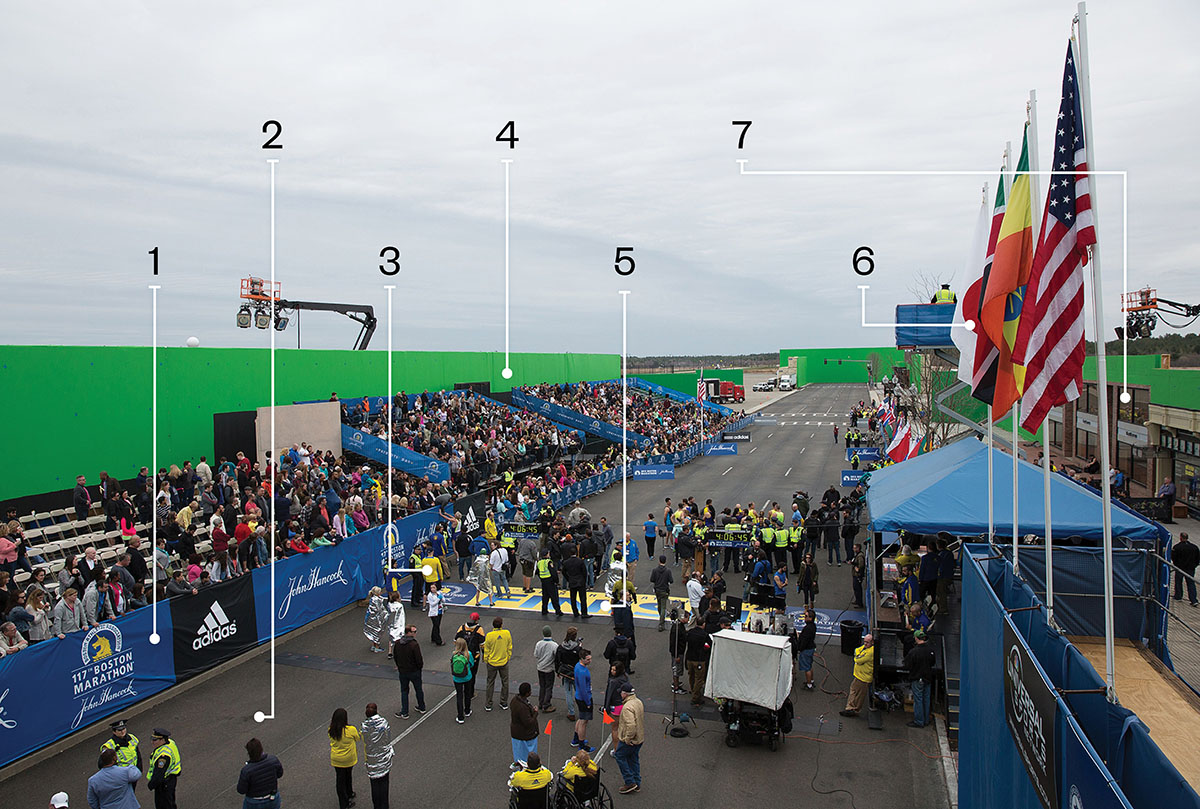
Photograph by Karen Ballard
The set was created using 50 carpenters and about 20 painters, who began work in the middle of February 2016.
1. All of the banners and graphics were printed to match the style of the 2013 marathon.
2. Duffield meticulously mapped out the location of granite tiles, bricks, and even notable gum spots while re-creating Boylston Street.
3. Extras were given yellow jackets to match those worn by officials at the 2013 marathon.
4. Boston Marathon organizer Eddie Jacobs had his crew break down the actual finish line the minute the 2016 race was over so the filmmakers could use the real bleachers, grandstands, photo bridge, and other pieces for the movie.
5. New Hampshire–based AMI Graphics made a replica vinyl transfer of the finish line for the film.
6. The international flags featured on the photo bridge, a staging area for the press by the finish line, were the same ones that were flying when the bombs exploded.
7. To re-create the brick LensCrafters building, now an AT&T store, the crew built the upper story to match how it looked three and a half years ago. The interior was also replicated, including the displays of lenses and frames.
True Characters
The real-life heroes of the Boston Marathon bombings on how it felt to see themselves on the big screen.
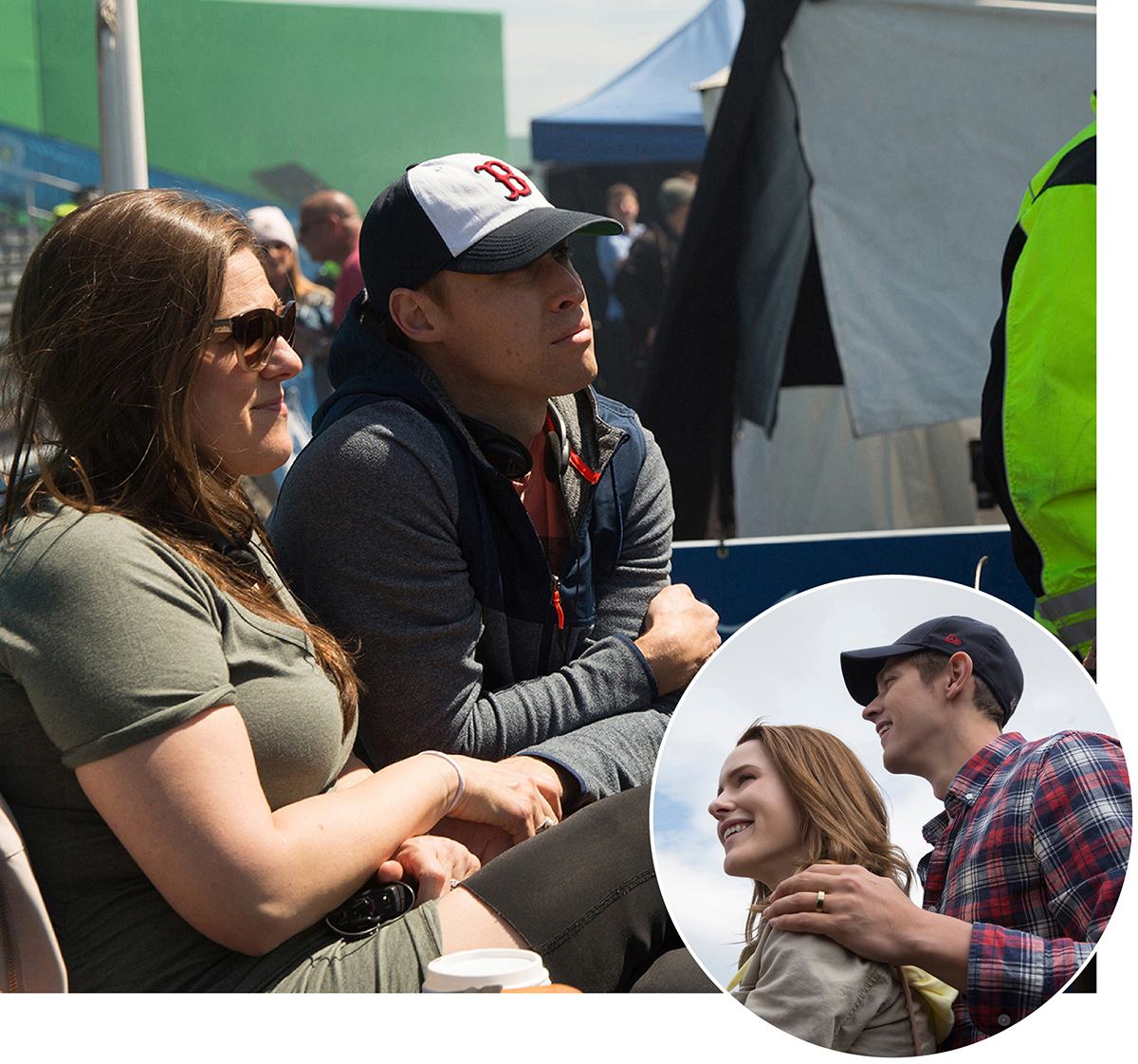
Photographs by Karen Ballard
Jessica Kensky and Patrick Downes, bombing survivors
Played by: Rachel Brosnahan and Christopher O’Shea (inset)
What it was like watching themselves in Patriots Day: “The first thing that struck us about the film is that our apartment in it is way nicer than the reality. We wish we had a Sub-Zero fridge! But we loved the cadence of the banter between our characters because it felt so natural. Rachel and Christopher were so sweet together. They brought so much talent to their roles, but they were also truly interested in our own experience. We feel a strong obligation to be representatives of the larger survivor community. The filmmakers somehow found us and asked us to be a part of this, but we hope our story is somewhat emblematic of each survivor’s story.”
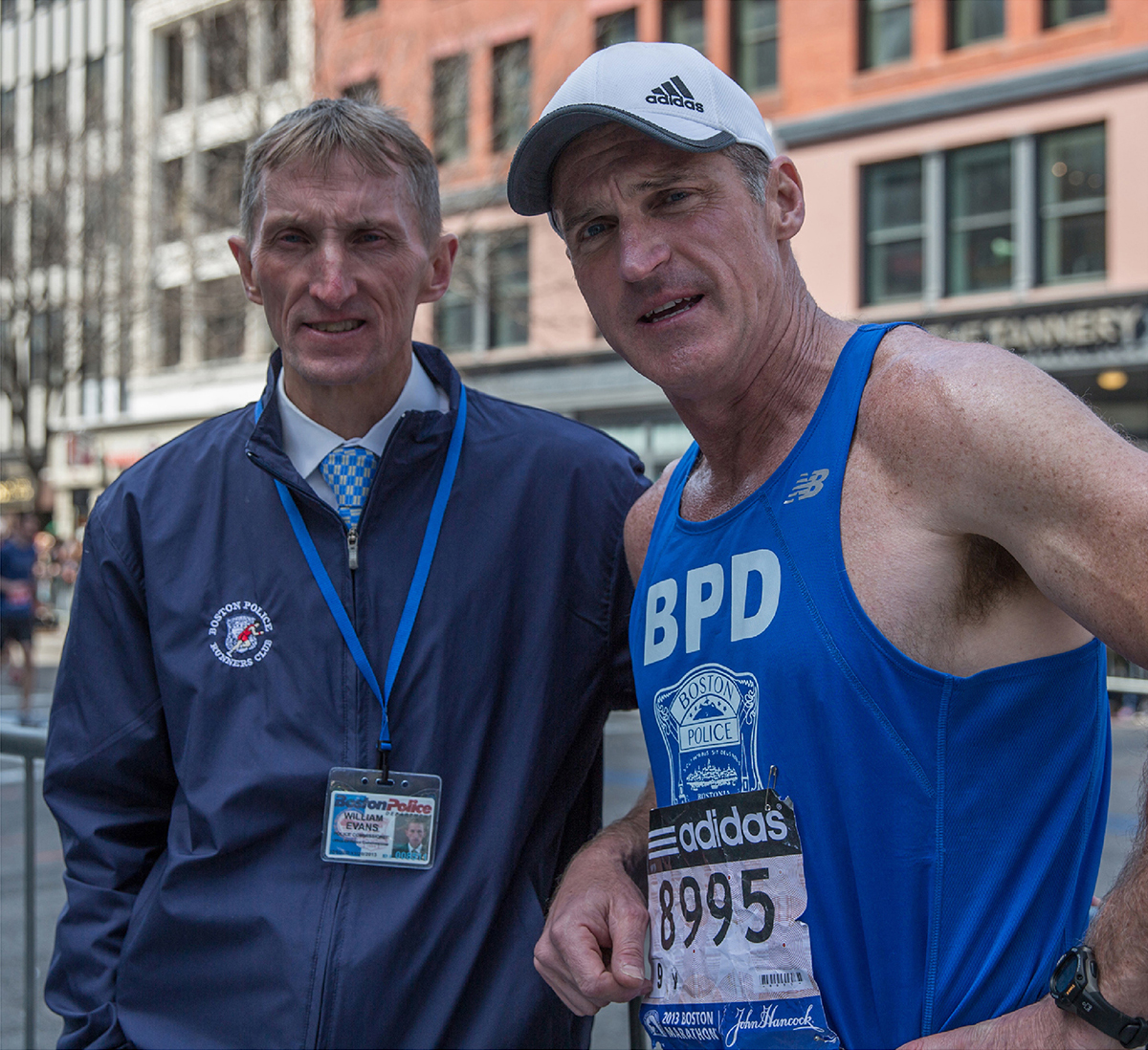
Photograph by Karen Ballard
William Evans, former Boston Police Department superintendent and current BPD commissioner
Played by: James Colby (right)
What it was like watching himself in Patriots Day: “It was emotional for me to see the film. I am a big marathoner and a lifelong city resident. I thought Jim Colby did a good job. He came to South Boston when he learned he was playing me. He was in my coffee shop, talking to people with me. We went to the Shamrock and met with my brothers, and he did his homework on who I was and the neighborhood. My wife and kids joke that when Jim, playing me, waves his arm at Mark Wahlberg on Boylston Street the morning of the race, he does me perfectly [laughs].”

Photograph by Karen Ballard
Dun “Danny” Meng, carjacking victim
Played by: Jimmy O. Yang (left)
What it was like watching himself in Patriots Day: “I really appreciate that they portrayed me in such a heroic way; this is just one night’s story and I am not that kind of person every day, but it is really flattering. I think the true heroes are the survivors, the people like Patrick and Jessica. The most impressive scene for me in Patriots Day, as far as bringing me back to that time, was when they are in the car and Jimmy, playing me, was trying to jump out. I could see Jimmy sweating and remembered that so vividly. I was very scared, but knew I couldn’t think too long and had to be decisive. I still relive making that decision and not knowing if it was the right one.”
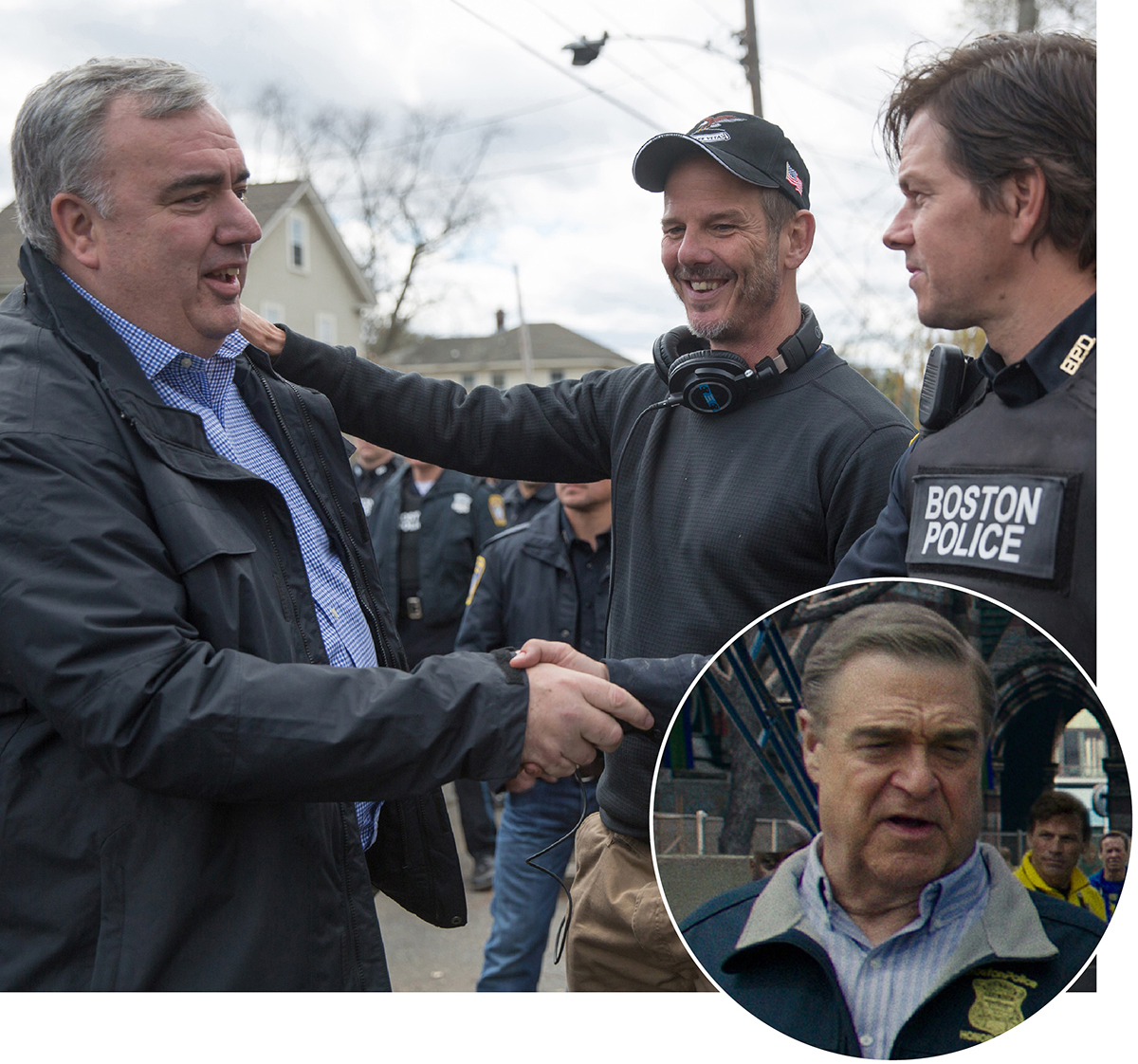
Photograph by Karen Ballard
Ed Davis, former BPD commissioner
Played by: John Goodman (inset)
What it was like watching himself in Patriots Day: “I was very happy with the selection of John Goodman as the actor portraying me. I was impressed that he spent a great deal of time getting the details down, and translating them in a way that depicted the stress of those few days. For me to feel comfortable, the telling of this story had to make clear that all of our efforts were dedicated to finding those responsible for the loss of the victims and the toll on the courageous survivors. I was impressed with Mark and Peter and their desire to honor these stories and the wishes of the victims’ families and the survivors who were involved.”

